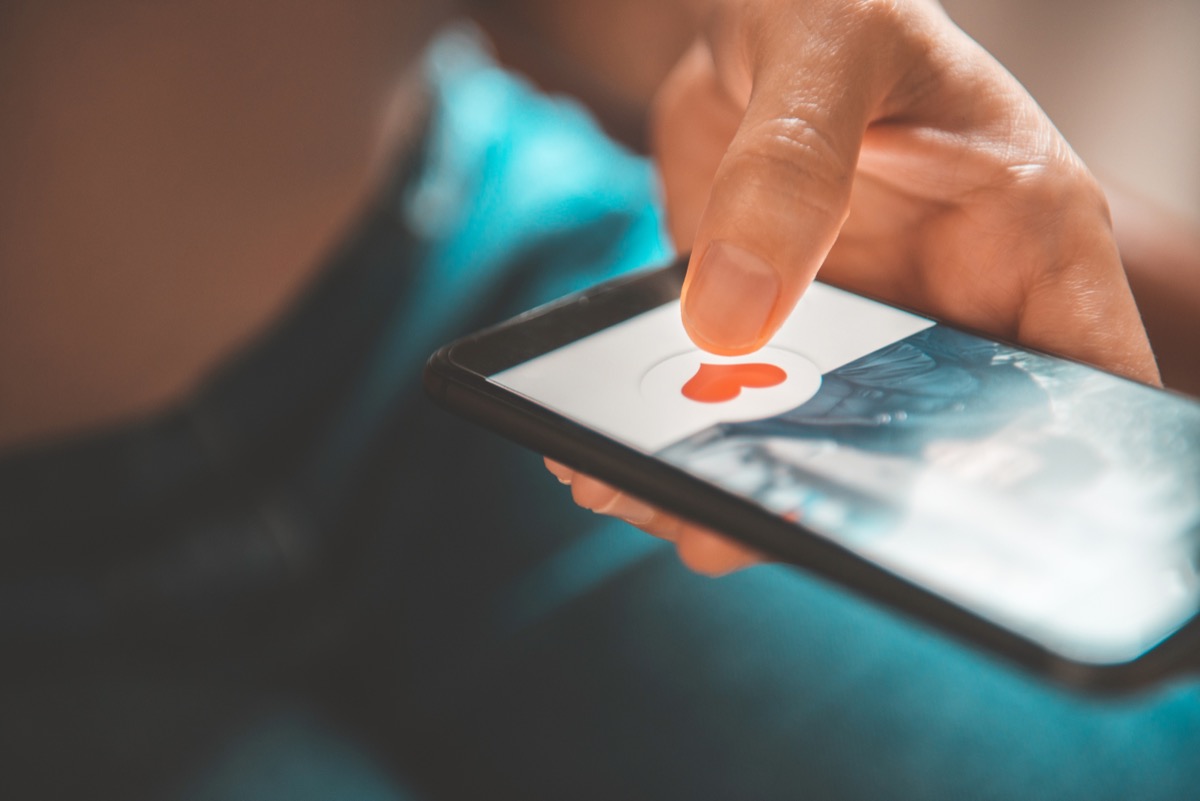10 Social Media Habits That Are Technically Cheating

For monogamous couples, infidelity is often considered the number one deal breaker. Cheating tends to break trust so deeply that it can undermine the sense that you ever knew your partner at all. There are some cases of cheating that lack ambiguity—sleeping with an ex, for instance, would be an undeniable breach of boundaries. However, there’s also a range of other actions that can be more subtly sinister yet easier to excuse. Many of these more nuanced interactions play out on social media, where the rules are, for some, less clear.
Most experts agree that because our online interactions can have a range of interpretations, it’s important to communicate openly with your partner about both of your expectations.
“Social media habits that could be interpreted as cheating or problematic in a relationship vary widely depending on the boundaries established by the couple, their individual perspectives, and past experiences,” explains Rachel Goldberg, MS, LMFT, founder of Rachel Goldberg Therapy.
Niloufar Esmaeilpour, MSc, RCC, SEP, founder and clinical director for Lotus Therapy & Counselling Centre, agrees that couples should dig deep and talk transparently when it comes to this sensitive topic.
“It’s a bit of a fine line between innocent social media interactions and behaviors that might be construed as ‘cheating,'” she tells Best Life. “There are certain activities, however, that seem more likely to raise concerns.”
While you likely don’t need much help in figuring out which online actions would hurt you if your partner overstepped, it can be helpful to examine your own habits with a critical eye and outside perspective. With that in mind, these are the online actions that are widely considered cheating—and how they could actually end your relationship.
RELATED: 5 Questions Your Partner May Ask If They’re Cheating, Therapists Say.
1
Messaging with an ex

Some people feel unthreatened by their partner communicating with an ex. If this is the case in your relationship, there’s nothing wrong with being in touch on social media with someone you used to date, assuming the content of the conversation is always above board.
However, if you find yourself sliding into your ex’s DMs in a way that would make your current partner uncomfortable, this can constitute cheating.
“Reconnecting with past romantic interests or ex-partners online, especially without informing your current partner, can lead to them feeling insecure,” says Goldberg. She adds that your partner may worry that they lack desirable qualities that your ex has or wonder if you have regrets about your past relationship ending.
2
Covering your tracks

Esmaeilpour says that any form of secretive communication will typically raise a lot of alarm, and this is especially true if the content of the conversation is intimate or romantic in nature.
“This may feel quite a betrayal,” she says. Going to great lengths to keep that secret will usually only compound the hurt.
Natalie Rosado, LMHC, founder and owner of Tampa Counseling Place, says that if you find yourself lying about who you’re talking to, deleting messages, clearing your browsing history, or otherwise covering your tracks, this is a major red flag.
“Furthermore, not allowing your partner to see your phone or hovering over them as they do can indicate you are hiding something from them,” adds Goldberg.
RELATED: 7 Things Only Cheaters Say.
3
Commenting publicly on someone else’s appearance

If you feel compelled to comment publicly on someone else’s appearance, it’s important to realize that your actions could leave your partner feeling embarrassed, hurt, and betrayed.
“I have heard so many examples of people getting into fights due to remarking on a person’s appearance publicly on Instagram,” says clinical social worker Genny Finkel, LCSW.
“People follow all different strangers, coworkers, friends, and acquaintances on social media. We don’t think much about remarking on a photo ‘looking good,’ or saying ‘you look so pretty.’ However, that can be a major boundary violation if you’re in a relationship and is considered cheating to many,” she explains.
4
Keeping secretive social media accounts

If one partner has created entire social media accounts in order to have communications that fly below the radar, this is another form of emotional infidelity. It can also quickly escalate into less ambiguous forms of cheating if those communications are taken offline and into real life.
“Having social media accounts that your partner is not aware of or using alternate profiles to interact with others or follow certain accounts indicates a lack of transparency and honesty in the relationship,” says Goldberg.
RELATED: 9 Red Flags That Signal Emotional Cheating, According to Therapists.
5
Flirting or having sexual conversations

For some people, occasional flirting may feel relatively innocent. However, if your communications read as flirty online, it’s usually because your words overtly express an interest in someone other than your partner.
“While some partners may take mild flirting lightly or see this as something harmless, others may take it as a very clear breach of exclusivity,” says Esmaeilpour.
This can take an even more obviously wrong turn if your communications become sexual in nature. “Engaging in sexually explicit conversations or flirting with someone other than your partner can be considered emotional infidelity,” Goldberg warns.
6
Sharing too much about your relationship

Everyone needs an outlet to process things that happen within their relationship—a trusted friend, family member, or therapist would all make for safe options. However, if you find yourself opening up to someone you’re attracted to about your partnership, this could be a major breach of boundaries.
“Sharing intimate details about your relationship… can fracture the emotional connection between you and your partner, leading to disconnect and feelings of mistrust,” says Goldberg.
In fact, this can create a dual betrayal: Besides sharing private information about your partner, you’re also building an intimate external relationship.
“Turning to someone else for emotional support rather than your partner can create feelings of jealousy and insecurity,” Goldberg notes.
RELATED: 5 Open Relationship Horror Stories From Couples Therapists.
7
Liking or commenting on someone’s photos

You may give very little thought to double-tapping someone’s selfie, but that “like” can send shockwaves through your relationship, especially if you establish a pattern of responding to one person’s content, which can indicate an enduring interest.
“Constantly liking, commenting, or direct messaging [in response to] someone else’s posts can be viewed as having desires that aren’t being met by your partner, or keeping yourself open to other options should the engagement lead to something further,” Goldberg says.
Instead, ask yourself if you’re giving any one person special treatment. If the answer is yes, this may mean you need to re-establish some healthier boundaries.
8
Following Instagram models

If you follow social media models based solely on physical attraction, this can also cause a rift in your relationship. “Following a model and liking their scantily clad photos can be considered cheating,” says Finkel.
However, she notes that this is one gray area where it’s common for couples not to see eye to eye, so it’s important to discuss your feelings about it before a problem arises.
“Clients are often surprised when their partners feel upset about them following random attractive individuals,” she says.
RELATED: 5 Signs Your Relationship Is Headed for a “Gray Divorce,” Therapists Say.
9
Sharing intimate photos or videos

If things have escalated to the point where one partner is sharing intimate photos or videos, this is widely viewed as cheating, Goldberg says.
“These behaviors can be considered problematic because they infringe on the trust, honesty, and commitment that are the basis of a healthy relationship. It’s important for couples to communicate openly about their boundaries regarding social media use and to respect each other’s feelings and concerns,” she adds.
10
Using—or even downloading—a dating app

You don’t have to physically cheat to break your bond—downloading a dating app signals an intent to cheat that can be just as hurtful.
“Using dating apps or websites to meet new people (unless previously agreed upon in an open relationship) is typically considered cheating. Many people use social media platforms as a gateway to access these apps discreetly,” says Rosado.
She explains that using dating apps conveys a lack of commitment to the relationship, suggesting that one partner is still looking for other options: “This can make the other partner feel undervalued and insecure and can lead to a deterioration of the emotional and intimate bond between the partners.”